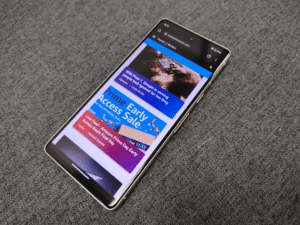Google is at the forefront of innovation in the tech industry, constantly pushing boundaries and introducing new features to enhance user experiences. One such advancement is the beta testing of Call Screen on Google Pixel devices. Call Screen leverages conversational artificial intelligence (AI) to transform the way we interact with phone calls. In this article, we delve into the significance of this beta testing and the potential impact it can have on communication.

Understanding Call Screen and Conversational AI
Call Screen is a feature available on Google Pixel devices that uses conversational AI to answer and screen incoming phone calls. Instead of directly answering the call, users can opt to have Call Screen handle it on their behalf. The AI-powered system engages with the caller, transcribes their responses in real-time, and offers suggested replies. Users can then decide whether to take the call, mark it as spam, or respond with one of the suggested replies.
Conversational AI, the underlying technology behind Call Screen, enables natural language processing and understanding. It allows AI systems to engage in human-like conversations, understand context, and respond appropriately. This advancement in AI technology has the potential to revolutionize the way we interact with various applications and services.
Transforming Phone Call Interactions
The beta testing of Call Screen on Google Pixel devices marks a significant leap forward in transforming phone call interactions. Traditionally, answering phone calls involved immediate human intervention, but Call Screen shifts the paradigm by introducing AI as an intermediary. By employing conversational AI, Call Screen can intelligently engage with callers, filter out unwanted calls, and provide users with valuable context and suggested responses.
This feature has multiple benefits. It can help users save time by filtering out spam or unwanted calls without interrupting their activities. It also reduces the need for users to engage in lengthy conversations, as the AI system can handle initial interactions on their behalf. Moreover, Call Screen’s suggested replies facilitate quick and efficient communication, enabling users to respond promptly to important calls.
The Future of Conversational AI
The beta testing of Call Screen on Google Pixel devices is just the beginning of what the future holds for conversational AI. As technology continues to advance, we can anticipate even more sophisticated AI systems that can seamlessly engage in conversations, understand nuances, and adapt to individual preferences.
Conversational AI has broad applications beyond phone call interactions. It can enhance virtual assistants, customer service chatbots, language translation services, and more. The ability to have natural, context-aware conversations with AI systems opens up new possibilities for seamless human-machine interactions.
Is Call Screen available on all Google Pixel devices?
Call Screen is available on select Google Pixel devices. The availability may vary depending on the device model and software version.
Can users customize the suggested replies provided by Call Screen?
At present, the suggested replies provided by Call Screen cannot be customized. However, Google continues to refine and improve the feature based on user feedback.
How does Call Screen handle languages other than English?
Call Screen is primarily designed to work with the English language. While it may have some capabilities with other languages, its accuracy and functionality may vary.
Can Call Screen completely eliminate unwanted phone calls?
While Call Screen can help filter out spam or unwanted calls, it may not eliminate them entirely. Its effectiveness depends on various factors, including the accuracy of the AI system and the extent of spam call detection.
When can users expect the full release of Call Screen?
As of now, Google has not announced an official release date for the full version of Call Screen. The beta testing phase allows them to gather user feedback and make necessary improvements before a wider rollout.
The beta testing of Call Screen on Google Pixel devices represents a significant step in the evolution of conversational AI and its impact on phone call interactions. By leveraging conversational AI, Call Screen empowers users to handle phone calls more efficiently, filter out unwanted calls, and engage in quick and context-aware conversations. As this technology continues to advance, we can expect even more transformative applications of conversational AI in various aspects of our daily lives, fostering seamless human-machine interactions and enhancing overall communication experiences.
